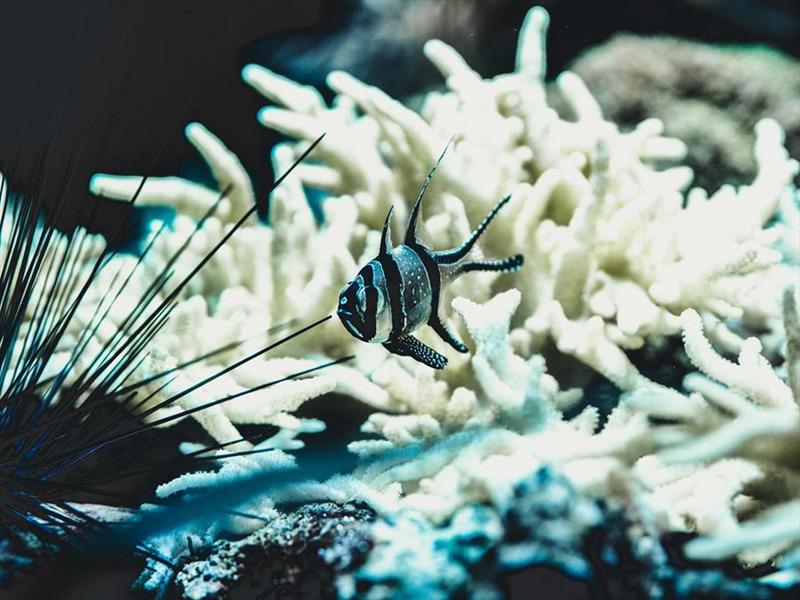
Coral bleaching: The canary in the coal mine for corporate greed and environmental destruction
by Biosphere Expeditions 5 Jun 2024 16:34 UTC

Bleached coral © Milan DeGraeve
The Reef Check Foundation, Biosphere Expeditions' partner for its coral reef citizen science work, has confirmed that a fourth global coral bleaching event is currently under way.
This is an urgent wake-up call to the world, it being the second global mass bleaching in the past decade. It heralds a new reality of more frequent and severe bleaching events as ocean temperature records continue to be broken. Cycles of decline and recovery are normal for coral reefs, but bleaching events, which kill whole swathes of reef, are now so frequent that they are threatening coral reef survival around the planet.
The value of reefs
"A world without coral reefs will be a major problem for humanity", explains Dr. Matthias Hammer, executive director of Biosphere Expeditions, the international citizen science NGO at the forefront of wildlife conservation, "because coral reefs have an estimated global value of €8 trillion each year, due to their contribution to the fishing and tourism industries, as well the coastal protection they provide. More than 500 million people worldwide depend on reefs for food, jobs and coastal defence."
Fighting the decline across the world
For Biosphere Expeditions, these increasingly frequent and devastating bleaching events are nothing new, of course. The NGO, celebrating its 25th anniversary this year, has worked in coral reef conservation for decades, with a string of findings, achievements and successes.
In Oman, for example, Biosphere Expeditions' citizen scientists showed that corals in Oman thrive in extreme conditions such as high salinity and temperatures, which would be considered marginal and highly challenging environments for corals in other parts of the world. Indeed, this remarkable ability may hold the key to coral survival in the face of global warming and its devastating effects on reefs across much of the planet. And further in Oman, Biosphere Expeditions' citizen scientists gathered data for five years before fishing was banned in 2013 in two secluded bays in the coral-rich waters of the country's Musandam peninsula in Oman by ministerial decree and the areas made MPAs. In parallel, Biosphere Expeditions ran an education and empowerment programme for Omanis resulting in historic first community-based reef surveys and the creation of Oman's first reef protection NGO with two citizen scientist Omanis from this now playing a leading role in Oman's reef conservation efforts.
In the Maldives, the NGO has been working since 2010, surveying for eight successive years an outstanding coral reef site called 'Rasdhoo Madivaru' until it was finally declared an MPA (marine protected area) by the Maldivian authorities in 2019. The site is both resilient to the worst effects of coral bleaching and harbours large megafauna such as sharks, manta rays, turtles and Napoleon wrasse. Besides this, Biosphere Expeditions in the Maldives has shown remarkable reef resilience and been instrumental in the creation of a local community reef surveying programme as well as education.
In Malaysia, coral reef expeditions to Tioman Island provided vital data on coral reef health and human-induced threats within the Tioman archipelago - data that were previously unavailable. This also helped build the foundation for 'Cintai Tioman', a long-term programme to increase social and ecological resilience on the island.
Finally, in Honduras, Biosphere Expeditions assisted the Cayos Cochinos Marine Protected Area with managing and protecting their coral reefs.
Corporate greed and environmental destruction: reefs are the canary in the coal mine
"We must do all we can to protect the planet's reefs", says Hammer, "not just because they are a canary in the coal mine of how humanity treats this planet, but also because we owe it to the people who rely on reefs and to those who come after us not to wreck this planet, which sustains us and of which we only have one." Hammer continues, "sure we can do our five Rs as individuals and people can come and help us as citizen scientists to fight the decline, which is utterly commendable, but in the end it will be about humanity reigning in corporate greed and destruction before it is too late. Because I concur that trashing the planet and hiding the money isn't a perversion of capitalism, it is capitalism. This system is simply no longer fit for purpose, indeed it is at the root of the vast majority of environmental problems we are facing now."